
Pietro Germi was an Italian film director, screenwriter, and actor, noted for his development of the neorealist and commedia all'italiana genres.
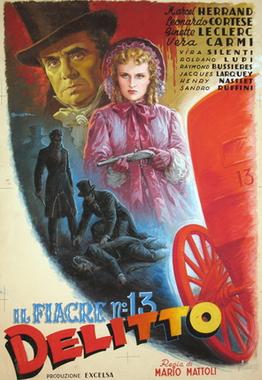
Cab Number 13 is a 1948 French-Italian historical crime melodrama film directed by Mario Mattoli and starring Vera Carmi, Ginette Leclerc and Sandro Ruffini.
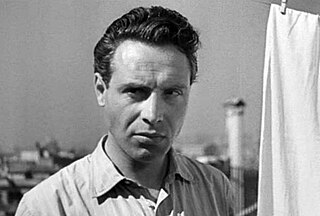
Roldano Lupi was an Italian film actor. He appeared in 60 films between 1942 and 1967. He was born in Milan, Italy and died in Rome, Italy.
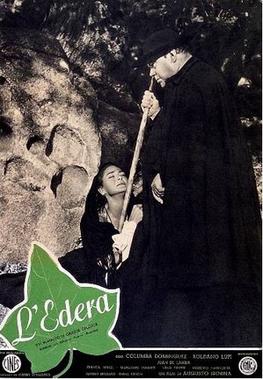
Devotion is a 1950 Italian melodrama film directed by Augusto Genina.
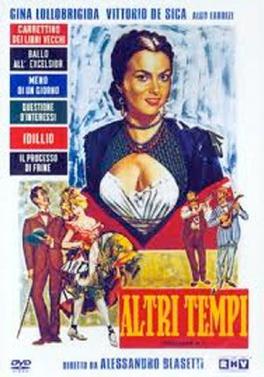
In Olden Days is a 1952 Italian comedy drama anthology film directed by Alessandro Blasetti and featuring an ensemble cast that included Gina Lollobrigida, Amedeo Nazzari, Vittorio De Sica, Elisa Cegani, Barbara Florian, Aldo Fabrizi, Andrea Checchi and Alba Arnova. It was shot at the Cinecittà Studios in Rome. The film's sets were designed by the art directors Dario Cecchi and Veniero Colasanti. It is also known as Times Gone By and Infidelity.
The Gates of Heaven is a 1945 Italian drama film directed by Vittorio De Sica.

Sicilian Uprising or Sicilian Vespers is a 1949 Italian historical drama film directed by Giorgio Pastina and starring Marina Berti, Clara Calamai and Roldano Lupi. The film is set in 1282, showing the events leading up to the War of the Sicilian Vespers. It is based on the libretto of the Verdi opera I vespri siciliani, which was itself based on an earlier play written by Eugène Scribe and Charles Duveyrier.

Giacomo the Idealist is a 1943 Italian drama film directed by Alberto Lattuada and starring Massimo Serato, Marina Berti and Andrea Checchi. It represents the directorial debut of Lattuada.

The Last Days of Pompeii is a 1908 Italian silent historical film directed by Arturo Ambrosio and Luigi Maggi and starring Lydia De Roberti and Umberto Mozzato. It was loosely based on the novel of the same title by Edward Bulwer-Lytton. The film was a success on its release, and its popularity is credited with starting a fashion for epic historical films.

The Courier of Moncenisio is a 1954 Italian historical melodrama film directed by Guido Brignone and starring Roldano Lupi, Virna Lisi and Arnoldo Foà. It is the last of three film adaptation of the 1852 novel Jean le Coucher by Jean Bouchardy.
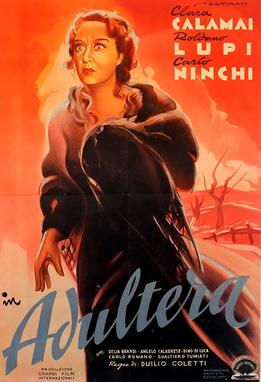
The Adulteress is a 1946 Italian melodrama film directed by Duilio Coletti and starring Clara Calamai, Roldano Lupi and Carlo Ninchi. It was shot at the Scalera Studios in Rome. Calamai received the Nastro d'Argento for Best Actress for her performance.
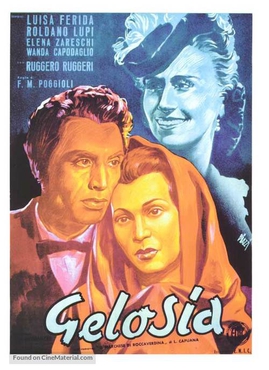
Jealousy is a 1942 Italian drama film directed by Ferdinando Maria Poggioli and starring Luisa Ferida, Roldano Lupi and Ruggero Ruggeri. The film was shot at the Cinecittà Studios in Rome with sets designed by the art director Gastone Simonetti. It belongs to the movies of the calligrafismo style. It is based on the 1901 novel Il Marchese di Roccaverdina by Luigi Capuana, which was later made into a 1953 film Jealousy.

Saint John, the Beheaded is a 1940 Italian comedy film directed by Amleto Palermi and Giorgio Bianchi and starring Totò, Titina De Filippo and Silvana Jachino. It was based on a play by Nino Martoglio. The film was made at the Cinecittà Studios in Rome.
Lowered Sails is a 1931 Italian drama film directed by Anton Giulio Bragaglia and starring Dria Paola, Carlo Fontana and Umberto Guarracino.

The Ten Commandments is a 1945 Italian drama film directed by Giorgio Walter Chili. It features an ensemble of Italian actors in episodes based on the Ten Commandments.
The Night of Tricks is a 1939 Italian "white-telephones" comedy film directed by Carlo Campogalliani and starring Amedeo Nazzari, Dria Paola and Maurizio D'Ancora.

The Priest's Hat is a 1944 Italian historical thriller drama film directed by Ferdinando Maria Poggioli and starring Roldano Lupi, Lída Baarová and Luigi Almirante. It is based on the 1888 novel of the same title by Emilio De Marchi.

Prelude to Madness or Loveless Lovers is a 1948 Italian drama film directed by Gianni Franciolini and starring Clara Calamai, Roldano Lupi and Jean Servais. It is inspired by the 1889 novella The Kreutzer Sonata by Leo Tolstoy.
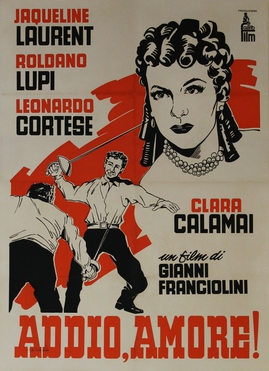
Farewell Love! is a 1943 Italian historical drama film directed by Gianni Franciolini and starring Jacqueline Laurent, Clara Calamai and Roldano Lupi. It is based on the 1890 novel of the same title by Matilde Serao.
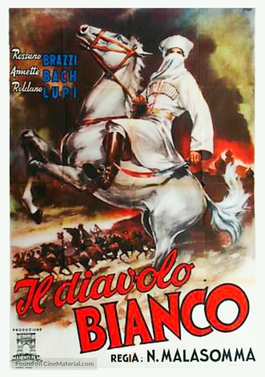
The White Devil is a 1947 Italian historical adventure film directed by Nunzio Malasomma and starring Rossano Brazzi, Annette Bach and Roldano Lupi. It is based on Leo Tolstoy's 1912 novella Hadji Murat.
















